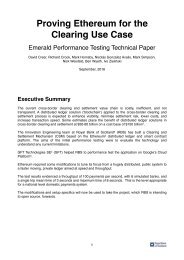Bitcoin and Cryptocurrency Technologies
1Qqc4BN
1Qqc4BN
Create successful ePaper yourself
Turn your PDF publications into a flip-book with our unique Google optimized e-Paper software.
Let’s think about the incentives that drive people in this kind of lemons market. As a consumer, you're<br />
not willing to pay extra for a high‐quality car, because you just can't tell the difference. Even if the<br />
used car dealer says that a car is perfect <strong>and</strong> is only an extra hundred dollars, you don’t have a good<br />
reason to trust the dealer.<br />
As a consequence, producers can't make any extra money by selling a high‐quality car. In fact, they<br />
lose money by selling a high‐quality car because it costs a bit more to produce <strong>and</strong> they don't get any<br />
price premium. So the market gets stuck at an equilibrium where only low‐quality cars are produced,<br />
<strong>and</strong> consumers are relatively unhappy with them.<br />
This outcome is worse for everybody than a properly functioning market would be. It's worse for<br />
buyers because they have to make do with low‐quality cars. In a more efficient market they could<br />
have bought a car that was much, much better for a slightly higher price. It's also worse for producers<br />
— since the cars that are on the market are all lousy, consumers don't buy as many cars as they might<br />
otherwise, so there's less money to be made selling cars than there would be in a healthy market.<br />
That's a market failure. This particular example has is not inherently dependent on cars. Any good (r<br />
“widget”) for sale which suffers from “asymmetric information” in which either sellers or buyers are<br />
have much better information about the quality of the good may result in a market failure. This type<br />
of market failure is called a lemons market, though the economics literature provides many more<br />
examples.<br />
Fixing a lemons market.There are some market‐based approaches that try to fix a lemons market.<br />
The first relies on seller reputation. The idea is that if a seller consistently tells the truth to consumers<br />
about which widgets are high vs. low quality, then the seller might acquire a reputation for telling the<br />
truth. Once they have that reputation, they may be able to sell high‐quality widgets for a higher price<br />
because consumers will believe them <strong>and</strong> therefore the market can operate more efficiently.<br />
This sometimes works <strong>and</strong> sometimes doesn't depending on the precise assumptions you make about<br />
the market. Of course, it will never work as well as a market where consumers can actually tell the<br />
difference in quality. For one thing, it takes a while for a producer to build up a good reputation. That<br />
means they have to sell high‐quality widgets at low prices for a while until consumers learn that<br />
they’re telling the truth. That makes it harder for an honest seller to get into the market.<br />
The other potential problem is that a seller, even if they've been honest up to now, no longer has the<br />
incentive to be honest if they want to get out of the market (say, if their sales are shrinking). In that<br />
case their incentive is to massively cheat people all at once <strong>and</strong> then exit the market. So reputation<br />
doesn’t work well at either the beginning or end of a seller’s presence in the market.<br />
A reputation‐based approach also tends not to work in businesses where consumers don't do repeat<br />
business with the same entity, or where the product category is very new, <strong>and</strong> therefore there hasn’t<br />
210









